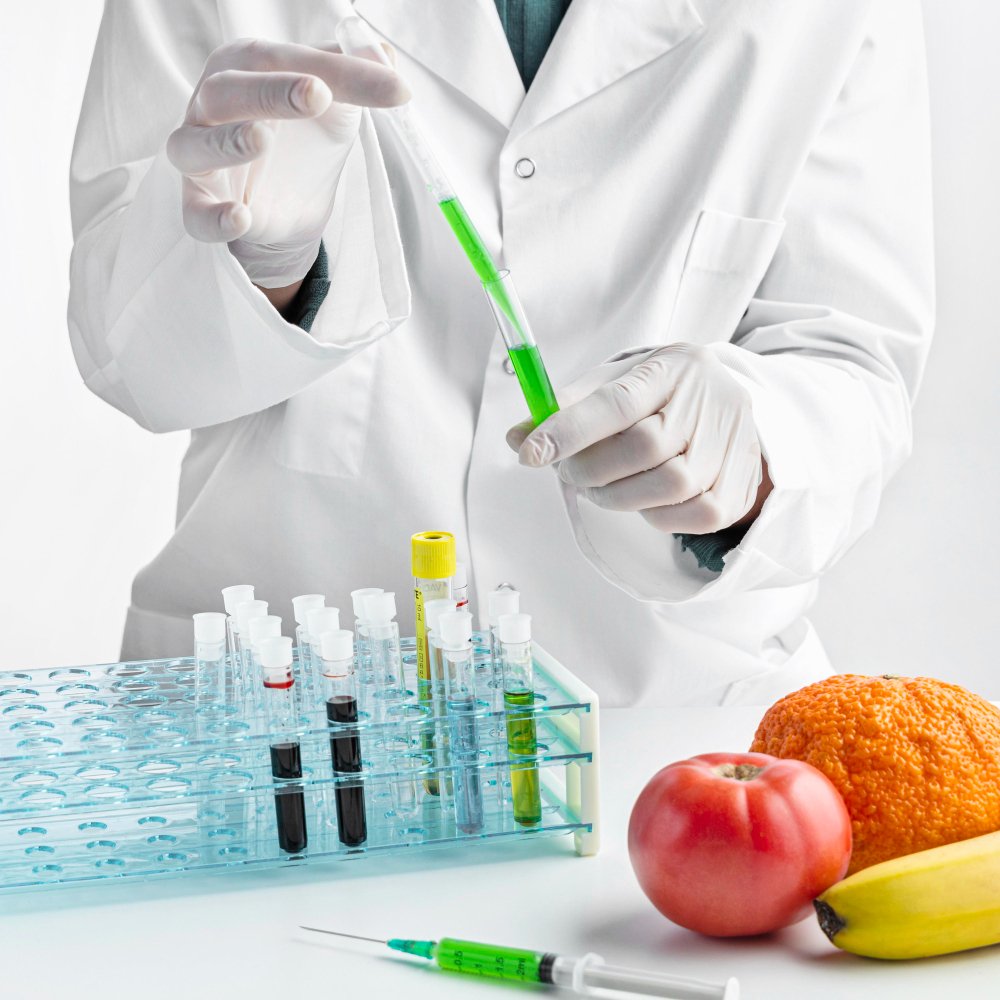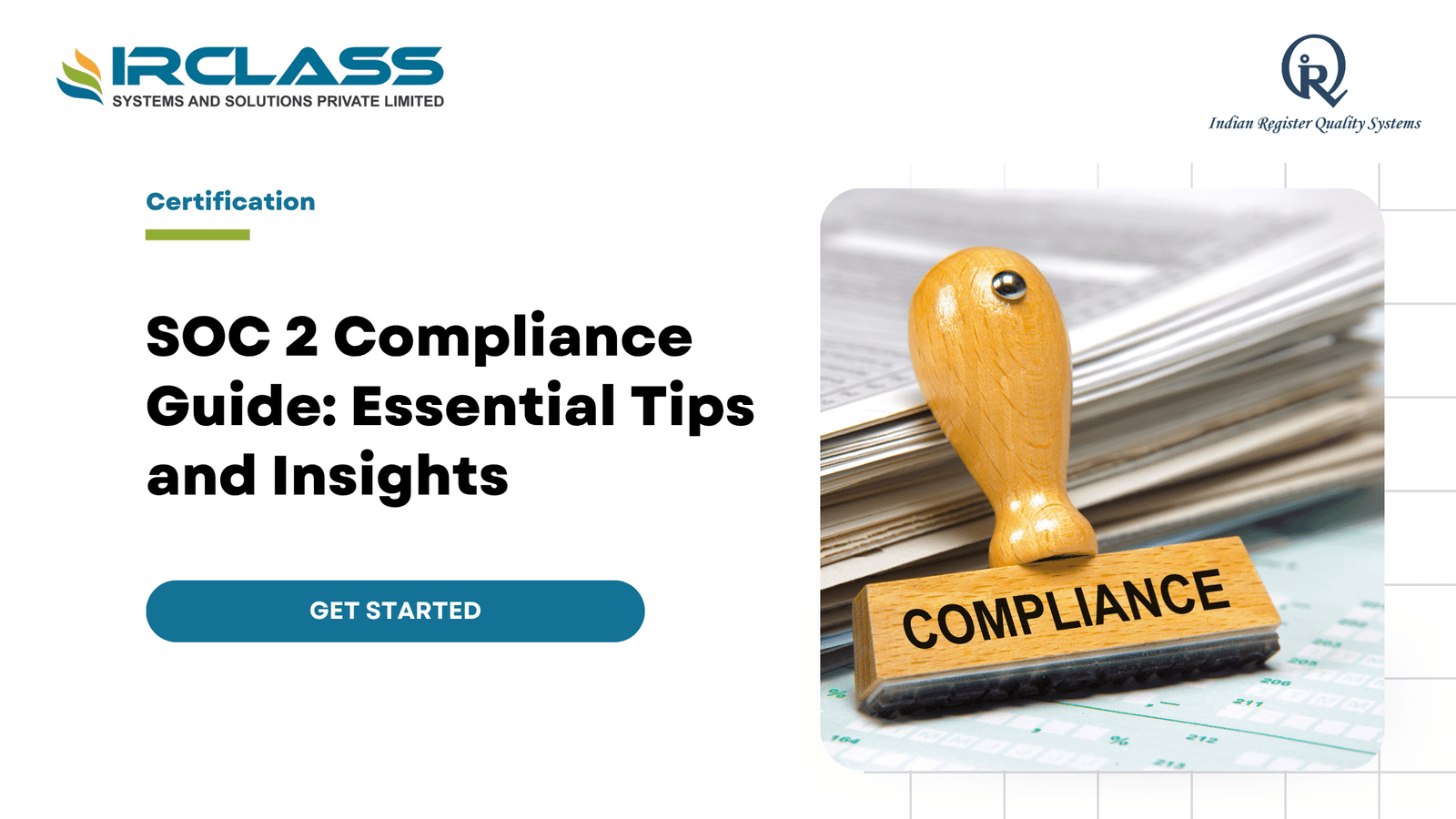Category: BRCGS Certification

Step-by-Step Guide to BRCGS Certification for Food Businesses
Now that food safety is important both to the law and to customers, businesses in food production must demonstrate their care for quality and hygiene. If you are in the food industry as a manufacturer, processor, packer or distributor, getting a globally accepted certification can increase your reputation and help you access new markets. The BRCGS (Brand Reputation through Compliance Global Standards) certification is a highly respected food safety standard around the globe. Many retailers, manufacturers and food service companies around the world rely on BRCGS certification to manage food safety, quality and comply with laws. What is required to achieve BRCGS certification? This guide explains all the necessary steps, starting with learning about the standard and ending with keeping your business compliant over time. What Is BRCGS Certification? BRCGS is short for Brand Reputation Compliance Global Standards. Originally developed by BRC, it is now a respected brand that establishes strict rules for food safety, packaging, storage, and consumer items around the world. Food manufacturers and processors use the BRCGS Food Safety Standard, which is approved by the GFSI and recognized globally. With certification, food businesses can handle safety, integrity, legality, and quality using an official framework. Besides the badge, it gives retailers, suppliers, and consumers the confidence that your products are the best in the industry. What You Need to Know Getting BRCGS certification gives a business an advantage in the international food market. Retailers and supermarkets may require you to have it. With certification, your internal operations are improved, your team becomes more aware, products are easier to track, and the risk of recalls or legal problems is lowered. Because a single food safety scandal can destroy a brand, having an effective and approved food safety system is now vital. The first step is to learn about the BRCGS Food Safety Standard First, download the latest edition of the BRCGS Global Standard for Food Safety. Read through it carefully to understand what your business will be judged on. The standard is based on various parts, including top management support, HACCP, food safety and quality systems, and good manufacturing practices (GMPs). It is necessary for leadership and quality teams to align with everything the standard sets out—from how documents are handled to how production is managed. Step 2: Perform a Gap Analysis After that, you should conduct a detailed gap analysis. Comparing your current system to the BRCGS requirements is part of this process. A gap analysis points out any issues, non-conformities, or missing processes that may affect your chances of being certified. For every gap, document it and establish a clear plan to fix it. This allows you to start making improvements in your system. Step 3: Develop or Improve Your Processes for Food Safety As soon as areas for improvement are found, update or create your Food Safety Management System (FSMS) to fulfill BRCGS requirements. These policies, procedures, records, and manuals should be based on the standard. Key elements usually include: Your FSMS needs to be carefully organized, recorded, and implemented in daily operations—not just written down. Step 4: Inform and Train Your Workforce Your certification relies on the success of the people you work with. All staff members involved in production, quality assurance, warehousing, and management should be trained on the BRCGS standard and your FSMS. Topics covered in training might include food hygiene, personal hygiene, cross-contamination, cleaning procedures, and the company’s reporting system. It is important to set up training regularly to cover new risks, updates to processes, or changes in the standard. Step 5: Carry Out Internal Audits Conduct internal audits in all departments before the official audit takes place. This gives you a chance to identify areas for improvement and simulate the real audit experience. Review your documentation, observe operations, interview employees, and document findings. Any non-conformities should be investigated and corrected with proper action plans. Step 6: Pick a Certification Body Now it’s time to select a certification body that is BRCGS-accredited. You need to find one with expertise in your sector and the ability to interpret the standard as it applies to your company. Collaborate with your chosen body to set the audit date, assess your readiness, and determine required documentation. Step 7: Plan and Set Up the Certification Audit Most often, your first audit is an announced audit. All parts of your food safety system will be assessed during the audit, including: All clauses in the BRCGS standard will be reviewed by the auditor. The results determine your grade—AA, A, B, or C. A higher grade increases credibility and can influence how often audits are required. Step 8: Address Any Non-Conformities Should non-conformities be found during the audit, don’t panic. You’ll have the opportunity to respond. Submit corrective action plans and supporting evidence within the defined period (usually 28 days). Once your application is approved, your certification will be granted. Step 9: Share Your Certification After receiving your BRCGS certificate, it’s important to share the news. Include the certification in your marketing materials, inform your clients, and update your website. For many retailers and distributors, this certification is a prerequisite to doing business. Step 10: Maintain and Improve Achieving BRCGS certification means committing to continuous improvement. To ensure ongoing compliance: By consistently improving, your business remains compliant, resilient, and ready for growth. Step 11: Recertify Your System Your BRCGS certification is typically valid for 12 months. A recertification audit is required before it expires. This process verifies that your organization maintains consistency and demonstrates ongoing improvement. Depending on your previous performance and risk level, recertification audits may be unannounced. You should always keep your food safety systems audit-ready. Usual Problems and How to Solve Them Some businesses face challenges like staff turnover, missing documentation, or lack of leadership involvement. These can jeopardize your certification efforts. The key to overcoming them lies in: Avoid shortcuts—they may lead to failed audits, financial losses, and damaged reputations. In Conclusion Gaining BRCGS certification is not only about following rules—it’s about enhancing your business.

BRCGS Audits: A Step-by-Step Guide for a Seamless Certification Process
The industrial sector for food processing and production is extensive. The various standards related to food safety and quality determine the brand quality. BRCGS or British Retail Consortium Global Standards is the world-famous authorizing agency defining the essential norms for food safety and quality. One can ensure the best quality control and safety measures with BRCGS audits. The integral components of the audit are diverse and the professionals play a pivotal role in the process. One must connect to the top professionals in the industry to meet the highest standards. In the food industry, safety is a pivotal aspect. The essentiality of safety control is beyond a box to tick on a compliance checklist. Food safety is integral for consumers and brands involved in its production. Ensuring product safety and high-grade quality ensures optimal compliance with food safety standards by manufacturers, retailers, and suppliers. BRC standards and audits are part of the ideal industrial practices and frameworks. These help businesses achieve optimal safety and quality status. Achieving BRCGS certification denotes a commitment to excellence and boosts reputation. It is a noteworthy aspect of food safety, quality, and compliance with industry norms is essential. About the BRC standards – A global initiative BRC was established in 1992. The British Retail Consortium or BRC promotes the ideal practices for the food industry amidst evolving landscapes. It defines the regulatory frameworks of UK and EU food safety laws. The BRC Global Standards or BRCGS is a prime global benchmark, promoting food safety and quality programs worldwide. BRC Global Standards is a prominent safety and quality certification program for food products. The standards were developed by the British Retail Consortium, the trade association of the UK retail industry. BRCGS covers an extensive range of food safety and quality concerns. The safety issues include – food safety management systems, product safety, packaging, storage, and distribution techniques. It also delivers a framework for product safety, quality, and operational measures for the food ingredient manufacturing, processing, and packing sector. The BRC Global Standards food safety certification program helps certify suppliers across different countries. Audit and understanding – Both are necessary The BRCGS audit requires an in-depth understanding of the standards defined by the consortium. BRCGS defines various standards tailored to meet the requirements of specific sectors like – food safety, packaging, storage, and distribution. Businesses can review the relevant standards based on the industrial type and product offerings to decide the best. Preparation is necessary to ensure a successful BRCGS audit. Hiring a dedicated team to oversee the certification process is the best approach. They can conduct a gap analysis drill to identify areas the shortcomings. The proactive approach helps implement the corrective actions before the audit commences. 9 Integral aspects – Critical to note BRCGS audit is relevant for organizations meeting the following criteria – The updated standards contain nine core sections, including – Significance of audit – The BRC can improve the safety and quality of food products with the best-in-class and high standards. BRC certification is a necessity for many retailers and suppliers. The certification has helped raise the standard for food safety across the industry. One can ensure the best solution by adhering to the defined benchmarks. The BRC-certified companies can manage and mitigate the risk of food safety incidents, ensuring optimal consumer confidence in their products. Components of BRCGS audit A BRC audit evaluates the compliance and safety status and helps you match them with the BRC Global Standards. It is a comprehensive assessment of the food safety management system, food management processes, and operational procedures for the organization. The audit is conducted by an independent BRC-accredited certification body, ensuring optimal safety and reputational advantage. Make a prudent call. Ensure the best audit services with professional auditors. They have the necessary resources to simplify the process and deliver accurate reports on the food safety index. IRQS is first certification body to receive NABCB Accreditation for BRCGS standard in India. Consider the professional services to ensure optimal accuracy.

Implementing BRCGS in India: Best Practices for Certification Success
Food safety is a vital factor in a food supply chain. Therefore, identifying the food producers that abide by the specific packaging material standards plays a prime role in ensuring food safety and hygiene. It also displays the reliability of a trusted supplier. The BRCGS Global Standard for Food Packaging Materials helps the different global brands demonstrate their updated packaging measures. The brands can deliver the best solution by providing products that are quality-assured, legally compliant, and follow the quality norms. What is BRCGS Certification? BRC, or British Retail Consortium, was founded in 1996. It was founded by retailers willing to harmonize food safety standards across the food supply chain. In the current times, BRCGS has become a leading global brand. The consumer protection scheme under BRCGS is recognized by thousands of customers across the globe. BRCGS Packaging Materials can develop confidence in the supply chain. It is easy to achieve by certifying the packaging producers in the food industry. The standard defines the ideal measures to conform the product safety and quality. There are various obligations with regard to legal compliance and consumer protection. One needs to follow a systematic approach to achieve a BRCGS certification for packaging and packaging materials. It is vital to assess the company’s premises, operational systems, and procedures. The assessment reports are checked against the requirements of the standard by the certification body. A global choice BRCGS was established in the UK in 1996, and since then, BRCGS has grown into a global brand. The certification program provides certifications for the leading retailers, producers, and food service companies across the world. In fact, 70% of the top 10 global retailers make it obligatory to produce a BRCGS certification before accepting a product in the stores. Develop client trust How can one rely on a brand? The certification defines the reliability of a brand. Determine the capabilities of food suppliers, brand owners, retailers, food service companies, and manufacturers with the help of the BRCGS certification. Whether it is a local brand or a global name, choosing a BRCGS-certified packaging producer can ease the needs. It will help you earn the trust of clients in your products. Associating with a BRCGS-certified packaging producer facilitates product enhancement with maximized safety and waste reduction. It also reduces the number of complaints and returns. Enhanced marketing prospects Brands can leverage the benefits of the BRCGS certification by using the framework as a positive marketing tool. It is critical to show customers that the product exhibits the best quality packaging and is compliant with the widely acknowledged food safety regulations. Brands can display the BRCGS Certificated logo on public-facing credentials. It can be anything, such as – packaging, websites, online content, and promotional materials. Companies with a BRCGS certification appear on the BRCGS Directory as well. Prime aspects of BRCGS – Ease the implementation steps. The BRCGS framework is efficient and effective. It covers several areas of food safety services. The prime aspects include – Packing and certification – The link The Global Standard for Packaging Materials was developed in 2001. It was designed to protect consumers by offering a mutual basis for the certification of an organization, supplying packaging to different food producers. The standard defines the ideal practices for product safety, quality, and operational criteria. All these are critical to maintain within a packaging manufacturing organization. It helps ensure optimal packaging quality. It is critical to achieve a BRCGS certification for packaging materials, and it involves the assessment of a company’s premises, operational systems, and procedures. All these need to be assessed against the prime requirements of the standard with the help of an annual audit conducted by the certification body. Since its inception, the globally recognized standard has been updated frequently. The updates are vital to reflect the latest improvements and inputs in product safety. After several updates, the framework provides a robust solution. It is necessary to manage the product quality and maintain legal compliance. In the current business scenario, BRCGS has been considered ideal for packaging and packaging materials by many brand owners, retailers, and manufacturers worldwide. It eases the need for assessing the capabilities of the suppliers. Get certified – Know the steps. Acquiring the certification is a multi-step process. Research is the fundamental step. A cost-effective decision to think of! The BRCGS guidelines are comprehensive and cost-efficient. Earning the certification is not a one-step process! Invest time and resources in the diverse aspects related to food safety. Focus on training and other Food Safety Certificate requirements. Implement the ideal methods of product safety management at the facility by selecting the correct path. Do not worry about the expenditure. Avoid expensive fines for the legal hazard related to food safety failures. Reduce food waste, meal comps, and their accompanying costs to make a comprehensive choice for all.

The Importance of BRCGS Certification in the Food Industry
Food safety is a vital aspect and matters the most in the food supply chain. It is essential to review the specific packaging material standards because they play a prime role in ensuring food safety and hygiene. It helps an organization to get recognized as a trusted supplier. The BRCGS Global Standard for Packaging Materials is ideal for food-based brands and helps demonstrate the best quality products. Ensure optimal quality assurance, legal compliance, and authenticity with BRCGS certification. About BRCGS – BRCGS was founded in 1996 by Brand Reputation through Compliance Global Standards. The certification is part of a renowned body operating with a set of safety standards and certification schemes across the globe. The BRCGS Food Safety and BRCGS Packaging and Packaging Materials are among the most prominent schemes. BRCGS certification exhibits the best manufacturing practices to be benchmarked. It helps deliver optimal assurance of high quality and safety across the dynamic food supply chains. Both industry specialists and consumers can vouch for the reliability and integrity of the globally acknowledged certificates on food and its ingredients. Prime areas of concern The certification framework has become a world choice and more than 22,000 sites in the world have adopted the BRCGS Global Food Safety Standard. It is recognized by the Global Food Safety Initiative (GFSI). The food certification incorporates international and local regulations and has been developed by food industry experts, including – retailers, manufacturers, and food services organizations. The certification exhibits a robust framework based on the various aspects related to product safety, integrity, legality, and quality. With well-defined operational controls for the manufacturing, ensure the best control over food packaging and food ingredients. BRCGS food safety focuses on – The framework is efficient and covers more than one area of food safety services. The prime aspects are – Food and packaging industry – Know the significance. The BRCGS Packaging Materials Global Standard is ideal for a manufacturer producing packaging materials for different products. The product range can vary from food to consumer goods. It is suitable and specifically designed to provide a world-class standard with maximized efficiency and effectiveness. It is an excellent tool for the packaging industry, and it ensures optimal consumer safety and compliance avoiding legal hassles. This standard was developed by the British Consortium or BRC, in partnership with The Packaging Society. There are two categories of operations, including – BRCGS packaging standard reviewing the following – Capture the vegan market with BGRS. The taste is evolving, and more people are turning vegan and choosing a vegetarian diet. In the fast-growing global plant-based markets, BRCGS brings the ideal solution. It provides a Plant-Based Certification based on the skills, expertise, and scientific knowledge of the food safety programs. The BRCGS plant-based certification program helps the manufacturing units to develop plant-based foods. It is an effective choice for the comprehensive management system approach. The BGRS program includes operational norms that guarantee optimal safety for plant-based products. Ensure the elimination of animal-origin material in vegan food products with maximized quality controls. It is convenient to add to the GFSI benchmarked Food Standard or Global Markets Program on the intermediate level, demonstrating the best commitment to serve the plant-based sector. BRCGS is efficient and keeps the clients informed with the well-documented and designed Plant-Based Trademark. Better business opportunities It is paramount to assess the service potential of food suppliers. One can find an efficient solution to assess the professional capabilities of the suppliers with the certification framework. There are many brand owners, retailers, food service companies, and manufacturers willing to acquire the BRCGS certification. But it needs a systematic solution. Whether it is a local brand or operating in an emerging global market, the BRCGS-certified packaging producer helps significantly. It boosts the product quality to earn customer trust in the long run. Working with a BRCGS-certified packaging producer pushes the standards of product safety. Additionally, it helps reduce waste, complaints, and returns. The practical benefits of the BRGS certification make it the ideal solution for manufacturers in the industry. The BRCGS certification enhances the prospects for a brand and boosts the international recognition for their product quality. It also amplifies the production to the next level. The standard safeguards the brands and consumers, assuring optimal operational guidelines and product quality and safety norms. If you are a food producer, supplier, or distributor and want to associate with large retailers, consider getting certified. The packaging must be BRCGS-certified to meet global standards and expectations. Closing note – Enjoy the diverse benefits. Make the best choice with the globally acknowledged certification and connect a single-standard third-party certification for quality standards and safety evaluation. It will help you reduce the cost, effort, and time. Enhance business performance with systematic solutions and boost the continuous improvement process. It results in increased efficiency of the operational process. Maximize the competitive advantage by following the globally accepted safety norms based on quality, hygiene, and food safety. Explore an opportunity to amplify the business and seek new markets with a robust BRCGS certification. Develop a trustworthy brand and gain customer confidence by establishing a self-improving quality, hygiene, and product safety system. Make the best choice by acquiring the certification systematically.

Ensuring Food Safety Compliance: The Role Of Certified Food Safety Courses
Modern hygiene policies have evolved comprehensively with the pandemic impact. One can find a drastic impact of hygiene and safety norms on industries related to health, food, and beverages. There are various integral factors related to food health and safety that impact the life and health of the consumers. The industrialists must conform to the requirements and maintain the best food management system. The food Safety standards have enhanced largely over the last few years, and it is critical to abide by the regulations. It is the need of the hour to address the prime requirements like – safety, quality, and integrity of the food products. Food safety certification is a third-party validation program that concerns the production and operations of the food and beverage industry. It offers a well-defined framework for quality management for food manufacturing processes. These food safety programs are distinctive and have definitive features that assure safety conformity. The safety programs cover various aspects, including – supplier evaluation, laboratory testing, industrial inspection, etc. From the business perspective – Food safety is integral for food businesses for more than one reason. One needs to have an overview of the critical requirements that make the food certification programs indispensable for all food business owners – About the food safety program The third-party verification programs for food safety involve the evaluation and quality assessment of food products, manufacturing processes, and operational systems. Acquiring the certification exhibits brand value and promotes business. The increased awareness of food safety training benefits the operations in the industrial unit. Everyone can stay aware of the integral roles in safety assurance, and thus, compliance becomes a hassle-free choice. An organization with food safety certification can vouch for the product quality and abide by the regulations defined by the food safety standard. Boost the operational confidence and ease the food management system with the best food safety policy. Understand the essentiality The need for a food safety certification program is paramount for the industrial leaders in the food business market. A food business with food safety certification can assure the best production outcome for the consumers and rule the marketplace with optimal confidence. The business can meet the requirements of the national or globally recognized safety practices for food and beverage production companies. It helps you maintain the best approach for food supply and management in the long run. An overview of the popular food safety programs – You must obtain an overall knowledge of the best-in-class food safety programs in the industry. It will help you succeed and make the best choice. ISO 22000 FSMS ISO 22000 FSMS certification is the first certification program that comes to mind when you hear about food safety. It is applicable to all food suppliers, and it promotes quality assurance within the food supply chain. The food safety program has become essential to ensure maximized safety and quality of the foods. With the ISO 22000 certification framework, enjoy these benefits – FSSC 22000 After ISO 22000, the next food safety program has to be FSSC 22000. It can be considered an extended version of ISO 22000. The goal of the FSSC 22000 is to monitor and mitigate the various food safety risks. FSSC is the abbreviation for Food Safety Management Certification Scheme. The certification scheme delivers structured plans and systems for food management, enhancing safety risks with efficient production. Adhere to the safety standards of FSSC 22000 and enjoy the unique benefits – HACCP HACCP is the abbreviation for Hazard Analysis Critical Control Points. It is similar to ISO certification programs and other food safety management standards. HACCP demonstrates the prime food production practices for enhanced safety and hygiene. The norms of the HACCP framework are exceptional for preventing microbiological, chemical, and physical contamination in the production unit. The benefits of HACCP are – Summing up Ensure the best practices for food safety and witness the business growth to the next level. It is an indispensable choice, and one must comply with the critical standards related to food hygiene and safety.

How Does FSSC 22000 V6 Compare To Other Food Safety Standards?
Food Safety System Certification 22000 is a notable scheme for those companies trying to maintain the maximum level of food safety management. It is critical to build and gain consumer trust and confidence. The version 6 of the globally-recognized FSSC scheme has been published by the authority. This current version exhibits multiple changes. It is designed to improve and enhance the scheme’s effectiveness. These changes are about to make an extensive impact on organizations in the food chain. Thus, one must stay up to about the FSSC 22000 V6 to understand how it would affect the business. Upgrade necessity – Know the need. Distinctive features of FSSC 22000 – What makes it unique? FSSC 22000 and ISO 22000 – Know the differences FSSC 22000 delivers a competent certification scheme with the vital features of ISO 22000 and an extensive list of standards for enterprises. The ISO 22000 certification framework contains lesser rigid requirements for the authority and enterprise, covering infrastructure and documentation maintenance. FSSC 22000 exhibits stricter requirements for infrastructure, covering the technical specifications of pre-industrial programs. The implementation of these requirements needs to be documented as part of the regulations of the framework. The requirements for the authority are vital for compliance, making the requirements of FSSC 22000 more rigid. It is necessary to develop and incorporate the critical procedures for ISO 22000 and FSSC 22000. There needs to be a thorough procedure for ensuring optimal management of documents, depending on the norms of production. The procedure of certification is similar for both schemes. However, the necessities of the FSSC 22000 scheme are more comprehensive and rigid, making it a labor-intensive process. Industries that can incorporate FSSC 22000 FSSC 22000 is suitable for various industries related to food and manufacturing. It includes – Prime benefits of FSSC 22000 – Positive impacts of the certification One can attain a systematic and competent strategy to identify and moderate food safety risks and hazards. The ISO-based certification model is apt for the food supply chain. FSSC 22000 is based on the ISO model. Thus, one can implement the framework with similar requirements. Read on and explore the benefits of FSSC 22000 and recognize the positive impacts of the certification – Industrial impacts with the new version – Experts must note Closing note – Audit impacts with the new version Due to changes in the accreditation document, the audit time for FSSC 22000 audits has been revised. The audit time has increased in many organizations. Many organizations need an integrated audit with enhanced management systems for food safety without reducing efficiency. Choose IRQS for an end-to-end solution related to FSSC audits and ease the professional requirements. Ensure an efficient audit session, meeting the revised norms of the FSSC 22000 audit. Image by Freepik

How To Choose The Right Food Safety Certification For Your Business?
Food Safety Certification authenticates the food business by implementing healthy practices ensuring optimal safety and quality. The environmental and distinct management systems are vital alongside the legal and standard compliance. If a business is linked with the food industry either directly or indirectly, one needs to get the food safety certification. From legal compliance to market essentials, there are ample reasons to make it an indispensable choice for food businesses. But how do you choose the right certification? Read on and know better. Success with food safety certifications – What makes it the apt choice? Before reviewing the various ways to pick the right safety certification for food safety, recognize the benefits and features – The ultimate reason to pick the best The purpose of industrial accreditation is uniform across the globe. Once a company gets certified, it is accepted everywhere! However, there are individual organizations certified with two or more food safety standards. A comprehensive framework introduces an all-inclusive administration and reduced redundancies in the organization. In the long run, it acts as a source for generating income via additional certification. There is more than one certification standard and scheme across the globe. Hence, the process of selecting the appropriate scheme is a critical task. Here are a few essential aspects that play a vital role in decision-making while browsing the certifications. What about the customer’s expectations? The customer demands incorporating a specific scheme may be a critical aspect of an organization. Most food organizations with numerous customers review the most-popular scheme. Understand that there is no scope for negotiation with the customer, and you can exhibit your rationale while making a firm choice. For instance, if a customer insists on BRC certification, you must negotiate a GFSI-approved certification scheme. Why? Because GFSI benchmarked standards include multiple schemes. It includes – BRCGS or BRC, FSSC 22000, IFS, SQF, and GLOBALGAP. Thus, you must recognize the customer expectation and pick the apt certification scheme. Review the size of the organization. GFSI benchmarked standards are practical. These are convenient and achievable by organizations of a specific size. Thus, the size of the company plays a significant part in making the apt decision. Small and micro food businesses must review the elementary options like the FSSC development program for global markets. The small and micro food businesses can also go for other independent schemes SALSA. However, the geographical location plays a distinctive role. The SALSA scheme is independent and it is an apt choice in the UK. These are appropriate starting points if the business is small. What about resources? Most organizations with the norms approved by GFSI benchmarks need ample resources. The standards approval necessitates full-time technical personnel. Or there must be a consultancy service team. Professional resources are vital and you cannot avoid it. The technical resources are essential for implementing and maintaining the norms and regulations of the popular food safety certifications. Features and Benefits of food safety certification Understanding the prime benefits of the certification will help you uncover numerous reasons to get certified. It is essential for – Improved Health and Safety – The prime factor The proper practices reduce the risk of contamination. It safeguards the product and food from pathogens like E. coli or Salmonella. One can identify the health risks and unsafe conditions, like – temperature abuse or poor hygiene. It is the prime intention of the certification. Help the workers around food-handling surfaces by following safe practices. Improved Customer Service – The goal Apart from recognizing the perks and purpose of the food safety program, clarify the goal. Why do you need it? With these certifications, one can implement new skills and ideal practices. It helps the customers receive superior service. Thus, you gain their trust and can expand the business in the long run. Summing the pros of getting the apt certification With the increasing cases of product recalls and unwanted food poisoning incidents across the world, consumers are losing faith in food products. Currently, information is easily available via social media. The consumers are aware and prudent, making the apt choice of food purchases. Manufacturers with certification can gain the trust for food safety among consumers, expanding overseas opportunities for the business. Apart from the vital features of the certification program, the factors that make a significant impact include – Final note – Get certified by professionals. Find trusted and qualified resources for the certifications. With an accredited provider of food quality and safety testing, the process of acquiring the certification and training for HACCP, ISO 22000, and FSSC 22000, becomes convenient. Connect to IRQS for a hassle-free audit service. It is efficient and effective for businesses looking for the ultimate solution.

BRCGS Certification: Improve Food Safety Culture
Food safety culture is a modern term for food safety. It is challenging to define it for organizations with their respective requirements of food safety culture. Dr. Joanne Taylor developed the modern term food safety culture in the Food Safety Culture Excellence Model. Dr. Taylor defined food safety culture as the “prevailing attitudes, values, and practices related to food safety that are taught, directly and indirectly, to new employees”. Global Food Safety Initiative (GFSI) and BRCGS have similar definitions. The GFSI outlines food safety culture as “shared values, beliefs and norms that affect mindset and behavior toward food safety in, across and throughout an organization.” On the other hand, BRCGS delivers a definition of the culture as – “The attitudes, values, and/or beliefs which are prevalent at the site, relating to the importance of product safety, and the confidence in the product safety systems, processes and procedures used by the site.” One can notice the similarities among these definitions. But food safety culture is more than these definitions. It is developed with multiple aspects that are all equally important. Food safety culture is a culture of a business or workplace focusing on all vital aspects of food safety. It demonstrates the ideal standards of safety for all members of staff. Essentiality of food safety Anyone related to the food-based business can recognize the essentiality of food safety and its role within the organization. It is convenient to display and remind the staff to uphold the ideal practices and procedures with the updated food safety culture. It is a straightforward task to monitor compliance with the due diligence checklists. BRCGS Food Safety Issue 9 has elaborated on the concept of food safety culture. It is an indispensable choice for senior management to exhibit a commitment level. It also promotes continuous improvement of food safety culture within an organization during a professional certification or internal audit. Companies with an enhanced opportunity for business can market their food safety culture and get it assessed, during the on-site food safety audit. Boosting the practices of a food safety culture in an organization or business can augment the scope of training on food safety practices for staff. In the long run, it generates benefits such as optimal compliance, zero legal issues and premium safety standards throughout the business, and an engaged workforce. Understanding from the organization’s perspective A well-defined food safety culture will assist the organization score high. One can always be prepared for an unplanned and unannounced audit with a well-defined food safety culture. The significance of food safety leads to fewer costly recalls. In the long run, it impacts the profit and saves the business from potentially brand-damaging food safety accidents. One can avoid loopholes and unprofessional behavior that may result in unsafe food. One can save resources to minimize the expense and manage better. From product recalls, food wastage, legal fees, and damaged reputation – find suitable solutions with the food safety culture. All these are incentives for an organization to implement an excellent food safety culture. Apart from these, food safety culture helps employees feel engaged with their work. Better awareness and knowledge act as bonus pointers for them to act in accordance with the organization’s values and principles. It helps in aligning the staff and makes them better workers and ambassadors for the business in the long run. Food safety culture enhances staff engagement and retention. A company with a mature food safety culture, exhibits a uniform policy about everything in the business, including GMP or Good Manufacturing Practices, leading to business success. About BRCGS – Get an overall idea. BRCGS stands for British Retail Consortium Global Standards. BRCGS was established in 1996 and it was in this year that BRC published the first standard, BRC Food Technical Standard. BRCGS is led by the LGC group, a global life sciences measurement and testing company. BRCGS is a leading global brand essential to strengthen a business. The objective of BRCGS is to promote food safety, for food and non-food industrial categories. The purpose of BRCGS is to implement ideas and proven practices, assure quality, and develop confidence in the supply chain. BRCGS was created by retailers and incorporated by businesses across industries. Simply put, the BRCGS norms ensure product safety and quality and simultaneously safeguard the business from facing any charges by the enforcement authorities. Features that improve the food safety The BRCGS is critical for – Businesses following standard and reliable manufacturing practices can assure their vendors and customers about the safety of their manufactured products. BRCGS certification exhibits that the products are safe, legal, and of premium quality. Here are some stats to prove the point – BRCGS is a benchmark practice in the food industry across the globe. A lot depends on its acceptance at the global level. BRCGS empowers organizations and brands in the food industry to expand across the globe meeting the ideal quality standards. BRCGS offers a structured framework helping you ensure and maintain product safety, integrity, legal compliance, and quality. It streamlines the management of operational activities, including food ingredient manufacturing, processing, packaging materials, etc. Summing the benefits Comply with the food safety norms. With the ever-evolving significance of food safety and the expansion of food and packaging industries at a global level, food safety is an indispensable topic. It is a concerning issue in the current times. Food safety culture is also vital for the ones venturing into the food supply chain, manufacturing, and packaging industry. Ensure customer safety and protect brand reputation with a prudent choice. Get the BRCGS certification with the apt steps.
Search
Useful Links
Recent Posts

What Is Carbon Footprint Verification & Why It’s Critical for Your ESG Goals

Why ESG Reporting Is the Future of Business Strategy



